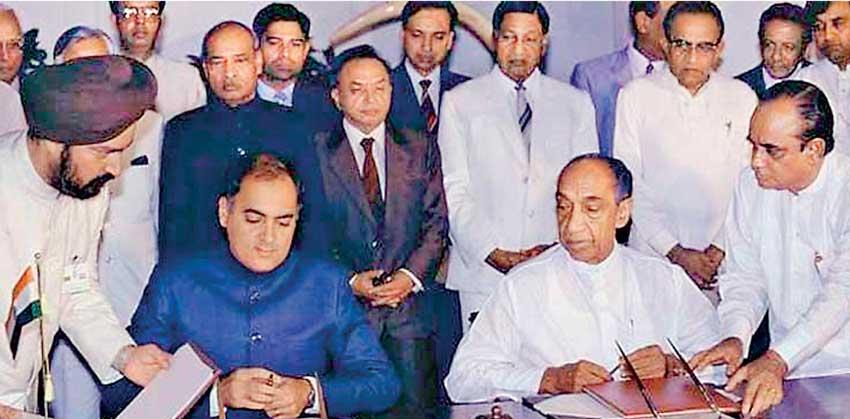09 Feb 2023 - {{hitsCtrl.values.hits}}

Indo-Sri Lanka Peace Accord Signed in 1987, paved the way for the enactment of the controversial 13th Amendment to the Constitution which is widely debated these days
 In 1987, former Indian PM Rajiv Gandhi soon to be assassinated by the very terrorist outfit he and his mother before him funded, trained and armed, in effect held a gun to the head of the then President of Sri Lanka, JR Jayewardene, forcing him to sign the Into-Lanka Accord and thereafter get the then parliament to pass 13A
In 1987, former Indian PM Rajiv Gandhi soon to be assassinated by the very terrorist outfit he and his mother before him funded, trained and armed, in effect held a gun to the head of the then President of Sri Lanka, JR Jayewardene, forcing him to sign the Into-Lanka Accord and thereafter get the then parliament to pass 13A

 If we are to go with the intent expressed by the President, we could very well see Chief Ministers of Provincial Councils having the kind of sway that even the President does not enjoy with regard to policing in their respective domains
If we are to go with the intent expressed by the President, we could very well see Chief Ministers of Provincial Councils having the kind of sway that even the President does not enjoy with regard to policing in their respective domains

 We do know that certain Chief Ministers belonging to certain ethnic groups have been averse to archaeology perhaps out of fear that wild narratives about what happened and creative historiography will be proven beyond a shadow of doubt to be absolute bunkum
We do know that certain Chief Ministers belonging to certain ethnic groups have been averse to archaeology perhaps out of fear that wild narratives about what happened and creative historiography will be proven beyond a shadow of doubt to be absolute bunkum
 There are some uncomfortable truths about the 13th Amendment, devolution of power and of course provincial councils. Let’s begin with the here-and-now. Provincial Council elections haven’t been held for years. It is more than 10 years since the Eastern Provincial Council elections were held and more than nine since they were held for the Northern Provincial Council.
There are some uncomfortable truths about the 13th Amendment, devolution of power and of course provincial councils. Let’s begin with the here-and-now. Provincial Council elections haven’t been held for years. It is more than 10 years since the Eastern Provincial Council elections were held and more than nine since they were held for the Northern Provincial Council.
Did the people in the Northern and Eastern provinces complain? Did their representatives complain? Did any who have screamed for devolution for the last 40 years raise even a whimper? Did those who make a living out of talking democracy, reconciliation, good governance, devolution and conflict resolution complain? Have those who are now, in the name of democracy, agitating for local government elections, ever insisted that PC elections be held? Did anyone say ‘constitutional provisions should be implemented?’
No. Simply, No. Humbuggery, yes!
Let’s go back to 1987. Rajiv Gandhi, the then Prime Minister of India, soon to be assassinated by the very terrorist outfit he and his mother before him funded, trained and armed, in effect held a gun to the head of the then President of Sri Lanka, JR Jayewardene, forcing him to sign the Into-Lanka Accord and thereafter get the then parliament (made of parliamentarians who he forced to sign undated letters of resignation) to pass the 13th Amendment. The people were not consulted. There was no debate.
Its enactment and implementation are questionable.
Most importantly, it wrecked rather than made easy administrative functions a case in point being agriculture, in particular agricultural extension. It has been estimated that on average no less than two-thirds of funds allocated to provincial councils have been used to pay salaries and maintain offices. Some PCs, like the Northern Provincial Council, couldn’t even spend all the money allocated to it in certain years. Simply, a white elephant.
Today there’s talk of the 13A being implemented to the letter, meaning police and land powers would be devolved. First of all, not only was the 13A imposed on the people it had nothing to do with ground realities. Devolution of power as a remedy to stated grievances of a given geographic, economical, historical and demographic realities is doubtful. We need not elaborate.
That said it has acquired legitimacy, if not in the circumstances of enactment by affirmation through practice — all major political parties have contested provincial council elections at one time or another. Not because they agreed with the narratives of ‘grievance’ and ‘aspirations,’ but that they saw it as a means to advance political projects, as individual politicians and as collectives.
Two factors may have served to dispel concerns regarding the 13A. First, the powers vested in the office of the president was the insurance policy against separatism. Secondly, land and police powers were never devolved. With regard to police powers, several amendments beginning with the 17th, in effect, made such devolution unnecessary. Land was not even talked about.
Now, if we are to go with the intent expressed by President Ranil Wickremesinghe, we could very well see Chief Ministers of Provincial Councils having the kind of sway that even the President does not enjoy with regard to policing in their respective domains.
Now there’s also the threat of each Chief Minister having the power to override all central government safeguards with regard to the protection of forests and the preservation of archaeological sites at will.
We do know that certain Chief Ministers belonging to certain ethnic groups have been averse to archaeology perhaps out of fear that wild narratives about what happened and creative historiography will be proven beyond a shadow of doubt to be absolute bunkum.
Forests! There are protected areas in all provinces. Even without land powers being devolved, forests are being cut down, partly in the name of development and probably more extensively on the sly. Just imagine nine politicians (and we know that it is a profession favoured by crooks, thugs and the uncivilized) with police and land powers running their own fiefdom. Pretty? Pretty grim!
A word about the JVP is necessary.
The JVP gained much ground riding the general antipathy to Indian intervention and opposition to the 13A. Sixty thousand (60,000) people, including JVP leaders and activists died in a period of two years (1988-89).
The JVP now wants the 13A to be fully implemented, i.e. with land and police powers devolved. Perhaps we’ve seen the last ‘Il Maha Samaruma’ of the JVP. Anura Kumara Dissanayake and Co., will have to answer to all the party members, supporters and others who perished during the bheeshanaya. Will Dissanayake say ‘those sahodarayas were ignorant back then!’
What should be done with such a piece of legislation?
Repeal. Simply, repeal.
08 Jan 2025 1 hours ago
08 Jan 2025 2 hours ago
08 Jan 2025 4 hours ago
08 Jan 2025 5 hours ago